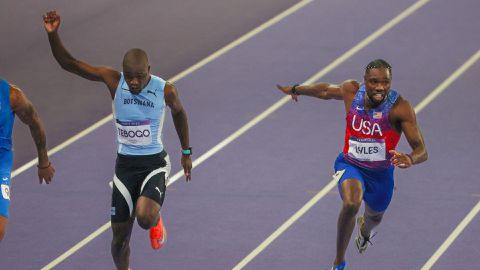Botswana’s Letsile Tebogo made history by winning the 200m at the Paris Olympics, becoming his nation’s first Olympic champion in that event.
Letsile Tebogo has shared new details about his landmark win at the Paris Olympics, where he became the first athlete from Botswana to secure an Olympic gold medal.
His victory in the 200m was not merely a triumph over rivals but also a personal achievement, coming after significant emotional and physical hardships, including the death of his mother.
At a recent press conference before the Zurich Diamond League, Tebogo joined other top athletes such as Grant Holloway and Masai Russell, but discussions inevitably circled back to his defining Paris race.
“I wouldn’t put it that way, but it feels amazing to be Olympic 200m champion, because, the whole thing, my mummy passing away, we just put all focus on the 200m, because the 100m wasn’t easy, it needed so much work to be done,” Tebogo stated, as reported by Sportkeeda.
The young sprinter also discussed his strategic mindset and the psychological aspects often present in track and field.
“But, with the 200m, we know that any medal is possible, but me going into the final with what I did on the semi-final, it gave me a confidence booster, but to myself I was like, maybe he’s playing mind games, but when he went off the band, I didn’t see him on my left, I was like, okay, now it’s just time for me to execute everything,” he noted.
In Paris, Tebogo clocked an impressive 19.46s, outperforming American favorite Noah Lyles, who finished third with a time of 19.70s while dealing with COVID-19. USA’s Kenny Bednarek claimed the silver medal, making it a highly competitive race among the world’s top sprinters.
Following his Olympic performance, Tebogo maintained his dominance at the Lausanne Diamond League, where he once again outpaced formidable competitors like Erriyon Knighton and Fred Kerley with a time of 19.62s.
Tebogo’s victory has had a profound impact back in Botswana and across the African continent.
“The support was really amazing to see. 30,000 plus people in the stadium, along the roads, coming back home and I believe my life has changed and I have changed a lot of lives in my home country,” Tebogo remarked, recognizing the broader influence of his achievements.
The 21-year-old sprinter views his success as a symbol of hope and inspiration, particularly for the African continent.
